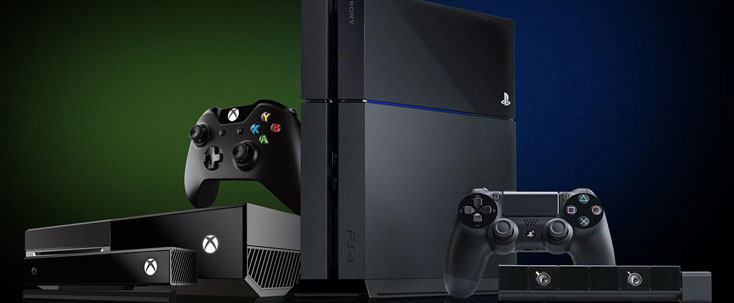Sony Computer Entertainment may not be a major PR player, but some would argue the hardware maker doesn’t have to be. In the great PS4 vs. Xbox One debate, Sony came out swinging at Gamescom, divulging a staggering 10 million PS4s sold since November. By comparison, the Xbox One’s latest unofficial tally puts the Xbox One at 5 million units moved.
The difference between “sold” and “moved” isn’t lost on anyone paying close attention, and it could be part of the reason Microsoft’s been on a PR binge. Worse yet for Xbox One owners, it might even spell an upcoming decline in Xbox One gaming options.
By definition, Sony has sold more than 10 million units to end users as of Aug. 10. That “to end users” point was made explicitly clear during the company’s Gamescom PS4 press conference, and was done so within the event’s first 10 minutes.
Microsoft, on the other hand, has stated it’s moved 5 million Xbox One consoles onto retail shelves, though each of those 5 million units hasn’t necessarily found a permanent home.
In terms of install base, that means the PS4 has outsold the Xbox One by at least a two-to-one margin, and perhaps even greater.
Those figures give Sony great bragging rights. To a certain extent they also give the company some justification for having an arguably less-visible PR campaign than Microsoft, which has really turned on the heat in recent months.
But the PS4 outselling Xbox One 2:1 means more long-term than bragging rights. It means Sony’s gaining an inside track into second-, third- and even fourth-gen titles for the current console generation.
Creativity be damned, all most publishers really care about is making money. Why else are many of them publicly traded? It sure isn’t to get a nifty ticker symbol. It’s to generate a return for shareholders, which means making money, which means developing games for the widest possible install base.
Microsoft managed to nab some Xbox One exclusives based on the success of the Xbox 360. Now that we’re entering the next generation of software, that advantage is starting to shift as publishers see Sony’s PS4 running sales circles around the Xbox One.
Over the long term, that means Microsoft could rely even more than it would like on first-party exclusives like Halo 5: Guardians, Quantum Break and Sunset Overdrive. You think Xbox One owners were miffed that PS4 owners got more time in the kick-ass Destiny beta? Wait until they get a load of the upcoming wave of PS4 exclusives that they won’t even get to touch.
One big wild card is Electronic Arts, which recently launched its subscription-based EA Access program for Xbox One. EA has been a staunch supporter of Microsoft since the Xbox One’s launch, highlighted most by Titanfall. When Sony rebuffed EA’s gestures with Access, the PS4 maker didn’t exactly do much to improve their perception with the #2 game publisher. If EA puts its true weight behind Xbox One, it could be the great equalizer for Microsoft’s ongoing battle with Sony.
Activision is no slouch, of course, and Destiny’s going to sell like hotcakes. Rightfully so. But Xbox and the Call of Duty franchise are in bed like Kanye and Kim, taking selfies and generally annoying people with their excessive public displays of (marketing) affection.
Microsoft wants to sell more Xbox Ones. That’s not news. But why does Microsoft want to sell more? In large part, it’s because Microsoft has great relationships with third-party publishers, and if the Xbox One doesn’t sell more — and soon — those third parties are going to get miffed, maybe even go elsewhere.
And that’s why Xbox One fans need to be so concerned by the whole “10 million PS4s sold” information. Fanboys will just use the figure for bragging rights, which is both pointless and stupid. The real reason for concern is what that means long-term for Xbox One as a destination platform. Both consoles have shown an incredible ability to sell like crazy; even the Xbox One has sold at unprecedented levels, although the PS4 has sold more. But if the Xbox One doesn’t start to make-up ground soon, the damage could be irreparable over the long haul.

